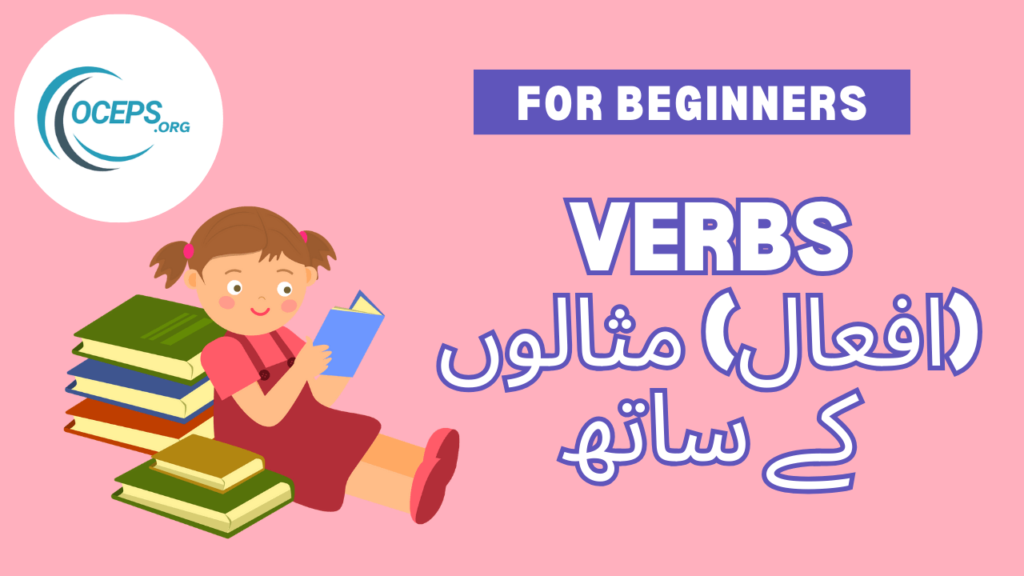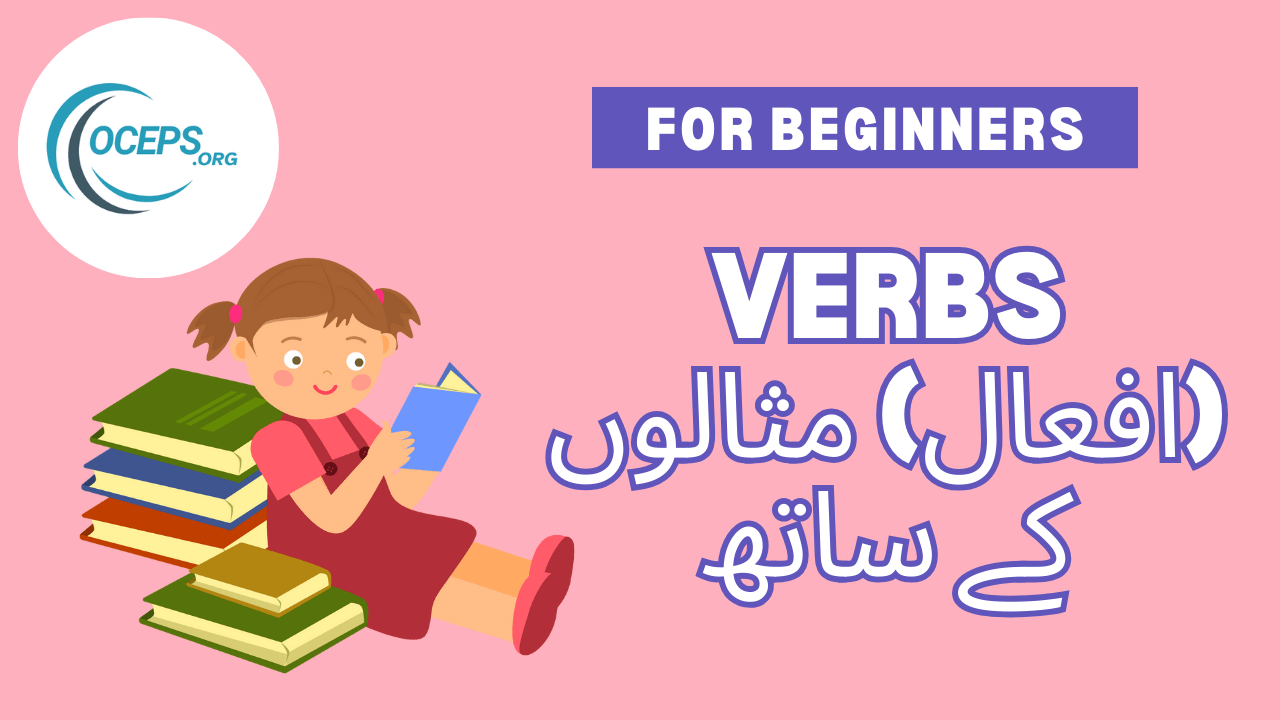Verbs are one of the most fundamental elements of English grammar. A verb is a word that expresses an action, occurrence, or state of being. In Urdu, verbs are called “افعال,” and they play a crucial role in forming meaningful sentences.
فعل وہ لفظ ہے جو کسی کام، واقعہ، یا حالت کو ظاہر کرتا ہے۔ اردو اور انگریزی دونوں زبانوں میں فعل جملے کو مکمل اور بامعنی بنانے کے لیے اہم کردار ادا کرتا ہے۔

What is a Verb? / فعل کیا ہے؟
A verb is a word that describes what someone or something does, what happens, or what the state of being is.
فعل وہ لفظ ہے جو کسی کام کے ہونے، کرنے، یا حالت کو ظاہر کرتا ہے۔
Examples / مثالیں:
- Action: Ali runs every morning.
علی ہر صبح دوڑتا ہے۔ - Occurrence: It started raining.
بارش شروع ہوگئی۔ - State of Being: She is happy.
وہ خوش ہے۔
Read also Pronouns (ضمیر): A Complete Guide with Examples: انگریزی میں ضمیر کی مکمل وضاحت مثالوں کے ساتھ
Types of Verbs / افعال کی اقسام
1. Action Verbs / عملی افعال
Action verbs describe physical or mental actions.
عملی افعال کسی جسمانی یا ذہنی عمل کو ظاہر کرتے ہیں۔
Examples / مثالیں:
- Physical Action: run, eat, write
دوڑنا، کھانا، لکھنا - Mental Action: think, believe, imagine
سوچنا، ماننا، تصور کرنا
Example Sentences / مثال جملے:
- She writes a letter.
وہ خط لکھتی ہے۔ - I believe in hard work.
میں محنت پر یقین رکھتا ہوں۔
2. Linking Verbs / ربطی افعال
Linking verbs connect the subject of a sentence to additional information about it. They do not show action.
ربطی افعال جملے کے فاعل کو اضافی معلومات سے جوڑتے ہیں اور کوئی عمل ظاہر نہیں کرتے۔
Examples / مثالیں:
- is, am, are, was, were, seem, become
ہے، ہوں، ہیں، تھا، تھے، معلوم ہوتا ہے، بننا
Example Sentences / مثال جملے:
- He is a teacher.
وہ ایک استاد ہے۔ - The soup smells delicious.
سوپ مزیدار خوشبو دیتا ہے۔
Read also Nouns (اسم): A Complete Guide with Examples انگریزی میں اسم کی مکمل وضاحت مثالوں کے ساتھ
3. Helping Verbs / معاون افعال
Helping verbs (auxiliary verbs) assist the main verb to form tenses, moods, or voices.
معاون افعال بنیادی فعل کی مدد کرتے ہیں تاکہ زمانے، کیفیت، یا طریقے کو ظاہر کیا جا سکے۔
Examples / مثالیں:
- is, am, are, was, were, have, has, had, will, shall, can, may
ہے، ہوں، ہیں، تھا، تھے، ہوگا، کریں گے، سکتا ہے، سکتا ہوں
Example Sentences / مثال جملے:
- She is writing a story.
وہ ایک کہانی لکھ رہی ہے۔ - I will call you tomorrow.
میں کل تمہیں فون کروں گا۔
4. Modal Verbs / حالت کے افعال
Modal verbs express ability, possibility, permission, or obligation.
حالت کے افعال کسی کام کی صلاحیت، امکان، اجازت، یا فرض کو ظاہر کرتے ہیں۔
Examples / مثالیں:
- can, could, may, might, shall, should, will, would, must
سکتا ہے، سکتا تھا، شاید، چاہئے، کرے گا، کرے گا، ضروری ہے
Example Sentences / مثال جملے:
- You must complete your homework.
تمہیں اپنا ہوم ورک مکمل کرنا چاہئے۔ - She can swim very well.
وہ بہت اچھا تیر سکتی ہے۔
5. Transitive and Intransitive Verbs / متعدی اور لازم افعال
Transitive Verbs (متعدی افعال):
A transitive verb requires an object to complete its meaning.
متعدی فعل کے لیے کسی مفعول کی ضرورت ہوتی ہے تاکہ اس کا مطلب مکمل ہو۔
Examples / مثالیں:
- He bought a car.
اس نے ایک گاڑی خریدی۔
Intransitive Verbs (لازم افعال):
An intransitive verb does not require an object.
لازم فعل کے لیے مفعول کی ضرورت نہیں ہوتی۔
Examples / مثالیں:
- She sleeps early.
وہ جلدی سوتی ہے۔
6. Regular and Irregular Verbs / باقاعدہ اور بے قاعدہ افعال
Regular Verbs (باقاعدہ افعال):
Regular verbs form their past tense by adding “-ed” to the base form.
باقاعدہ افعال کے ماضی کے زمانے میں “ed-” شامل ہوتا ہے۔
Examples / مثالیں:
- play → played
کھیلنا → کھیلا - work → worked
کام کرنا → کام کیا
Irregular Verbs (بے قاعدہ افعال):
Irregular verbs have unique past tense forms.
بے قاعدہ افعال کے ماضی کے زمانے کی شکل مختلف ہوتی ہے۔
Examples / مثالیں:
- go → went
جانا → گیا - eat → ate
کھانا → کھایا
Functions of Verbs / افعال کے کردار
1. Show Action / عمل ظاہر کرنا
Verbs describe what the subject is doing.
فعل یہ ظاہر کرتا ہے کہ فاعل کیا کر رہا ہے۔
Example / مثال:
- The dog barks loudly.
کتا زور سے بھونکتا ہے۔
2. Indicate Time / وقت ظاہر کرنا
Verbs help indicate the time of action through tenses (past, present, future).
فعل زمانے کو ظاہر کرتے ہیں (ماضی، حال، مستقبل)۔
Example / مثال:
- She studies every day. (Present)
وہ ہر روز پڑھتی ہے۔ - She studied yesterday. (Past)
اس نے کل پڑھائی کی۔ - She will study tomorrow. (Future)
وہ کل پڑھائی کرے گی۔
Common Mistakes in Using Verbs / افعال کے استعمال میں عام غلطیاں
- Subject-Verb Agreement Errors / فاعل اور فعل کے درمیان عدم مطابقت:
- Incorrect: He go to school.
- Correct: He goes to school.
غلط: وہ اسکول جاتا ہیں۔
درست: وہ اسکول جاتا ہے۔
- Tense Errors / زمانے کی غلطیاں:
- Incorrect: She eat lunch yesterday.
- Correct: She ate lunch yesterday.
غلط: اس نے کل کھانا کھاتی ہے۔
درست: اس نے کل کھانا کھایا۔
Read Also Basic English Grammar for Beginners: A Simple Guide / بنیادی انگریزی گرامر: ایک سادہ رہنمائی
Conclusion / اختتام
Verbs are the backbone of any sentence. Understanding their types, functions, and correct usage is vital for mastering English grammar. Similarly, learning verbs in Urdu will improve your ability to communicate effectively.
افعال جملے کا بنیادی حصہ ہیں۔ ان کی اقسام، کردار، اور درست استعمال کو سمجھنا زبان سیکھنے میں مددگار ہے۔ اردو اور انگریزی دونوں زبانوں میں افعال کا صحیح استعمال گفتگو کو مؤثر بناتا ہے۔



